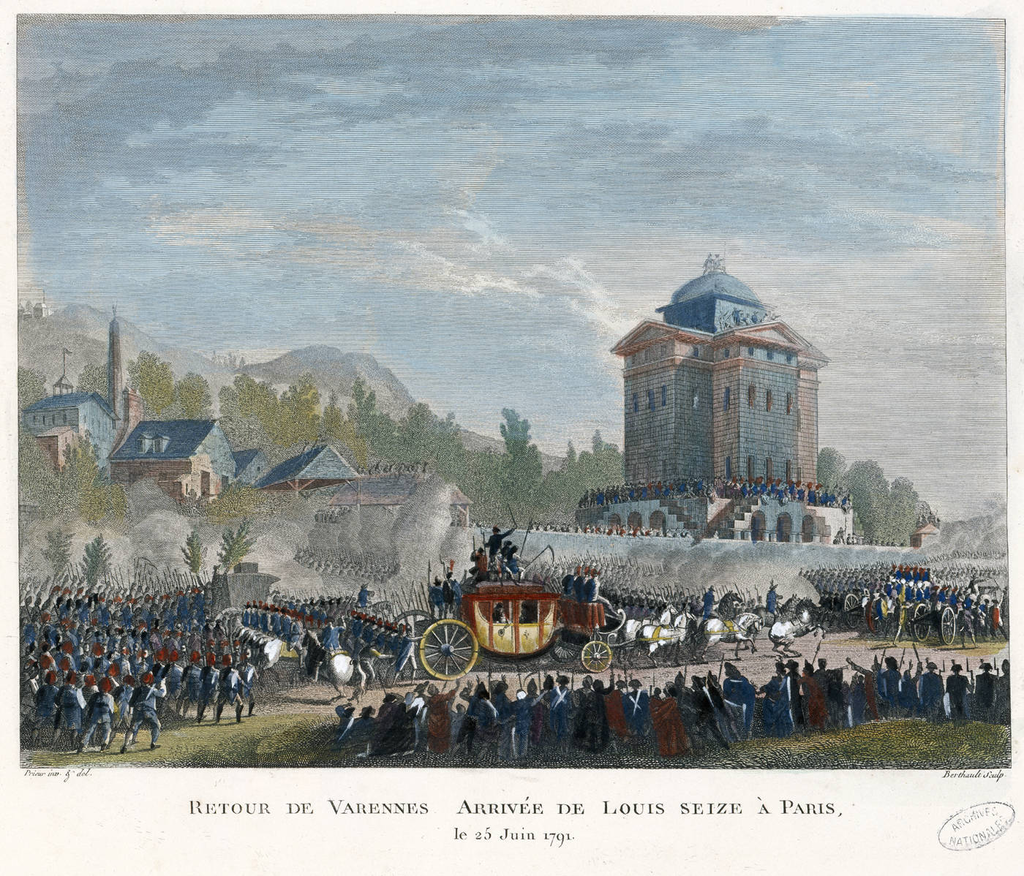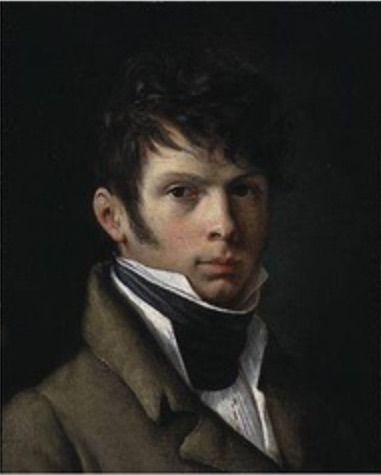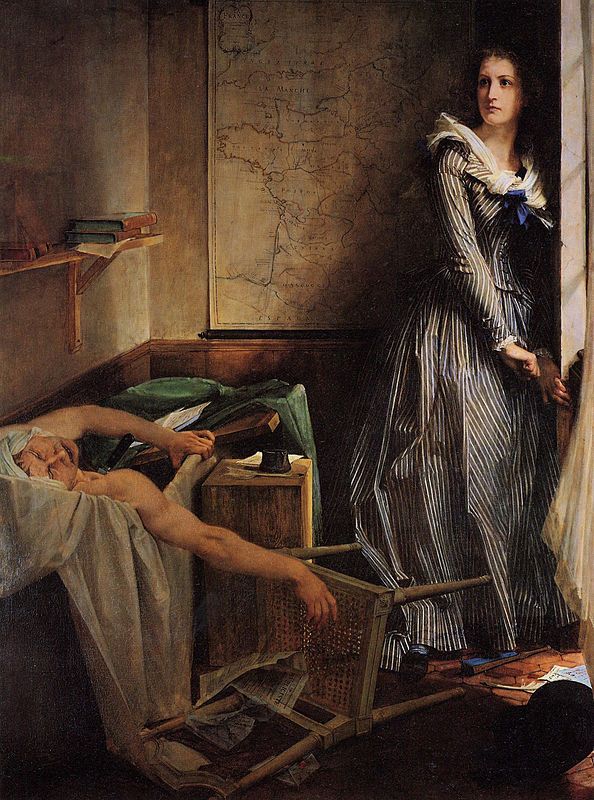Louis XVI and family being returned to Paris after their failed escape.
Source:- https://archive.org/stream/11499676....ge/n7/mode/2up
M. Curtius was a man of acute penetration, and knowing exactly the position of affairs, he was enabled to calculate what must be the inevitable issue whenever the trial of strength should be brought to the dreaded ordeal which he foresaw was rapidly approaching. Therefore, for his own preservation and that of his family and property, he adhered in appearance to that party whom he knew must prevail ; although he always declared to Madame Tussaud and her mother, that he was at heart a royalist, but he observed, if he pro- claimed himself such, it would not serve the king an iota nor retard for an instant the thunder- bolt which threatened all the royal family with annihilation ; even if he remained neutral, M.Curtius assured his family, he should only ensure their destruction whenever the republican party obtained the ascendancy.
This was the explanation Madame Tussaud received from her uncle when accounting for the number of visitors who frequented his house whose politics were of the most fanatical description, and whose theories concerning the different forms of government all tended to the subversion of monarchy. Amongst the rest, the Duke of Orleans was a most frequent visitor, and was regarded by Madame Tussaud almost with detestation, as were many of his satellites, by whom he was constantly surrounded ; and although these revolutionary enthusiasts seldom entered to any great extent on political subjects during dinner, and the ladies retired immediately after, yet enough was heard to convince Madame Tussaud that a terrific storm was gathering, and to cause her to tremble for its consequences.
Though the commissioners delegated to inquire into the affair of the king's departure acquitted him of any evil intentions towards his country, the mob without, and the Jacobin club, were determined to denounce him, and this led to repeated disturbances in the streets of Paris, which often terminated in bloodshed. Robespierre now made his appearance on the stage in support of republicanism ; but Danton and Camille Desmoulins were the most daring orators of the mob. Madame Tussaud remembered the latter, quite at the commencement of the Revolution in 1780, liaranguing the people in the Palais Royal mounted upon a table with a brace of pistols in his hand, shouting, "To arms !" He now plucked a leaf from a tree, with which he formed a cockade, and exhorted the people to follow his example, that it might form a bond of union in the sacred cause of contending for their liberties.
The trees were soon stripped of their leaves ; and as Camille Desmoulins remained the mouthpiece of the mob, and was by profession a lawyer, he was called the " Attorney-General of the Lamp-post," having caused and presided over several of these summary executions by the mob. He was born at Guise in Picardy, and was the son of a lieutenant-general. He first appeared before the public at the bar pleading against his father, whom he wished to compel to give an increase of allowance to his unnatural son, though he was aware that his parent's circumstances were too limited to render such an increase possible. He subsequently became secretary to Danton, and was a most active agent in promoting every bad purpose suggested by his employer.
At length the National Assembly arrived at the termination of its sittings. The constitution was completed and presented by sixty members to the king, by whom it was accepted, and immediately he was restored to an appearance of freedom ; that is to say, the guard under which Louis had been kept in a state of surveillance, was removed, and on his declaration of his acceptance of the constitution, there was a feeling of satisfaction in Paris, whilst La Fayette, taking advantage of so auspicious a moment, proposed a general amnesty, which should cast, as it were, a veil of oblivion upon all acts associated with the revolution. This proposition was carried and proclaimed amid shouts of applause, which was followed by throwing open all the prisons, and this was hailed by shouts of approbation from all quarters of the capital, and echoed from the remotest provinces of France.
But Louis scarcely understood the new constitution or the powers it gave to the Legislative Assembly. he had to suffer severe humiliations; first, the terms " majesty " and " sire " were to be omitted ; secondly, when the king entered the Assembly the members remained sitting, and one republican, more bold than the rest, ventured to come into his presence without taking off his hat. All this was gall and wormwood to Louis, who sobbingly told the queen the insults to which he had been subject at the first meeting of the Assembly. She endeavoured to console him, but the wound was not to be healed.
The king endeavoured to keep up as much dignity as possible, and the subject which gave most umbrage to the people was that Louis would not give up his veto ; which meant,of course, that he should have the privilege of annulling any decree of the Legislative Assembly if he should think it wise to do so. But the enemies of the king represented the veto in so obnoxious a light, that many absolutely thought that within it centred all their grievances, and, as a term of reprobation, the mob called his Majesty " Monsieur Veto." general was this designation, that many thought it was his real name. Madame Tussaud remembers a person asking her uncle the question, who expressed the deepest astonishment when told that the king's name was Capet.
At the commencement of the year 1792 every- thing was fast tending to republicanism. The masses wore the bonnet rouge as the symbol of liberty. The dress of the sansculottes was also very general. Madame Tussaud remembers once to have seen the Duke of Orleans clad in that singular costume. It consisted of a short jacket, pantaloons, and a round hat, with a handkerchief worn sailor fashion loose round the neck, with the ends long and hanging down, the shirt-collar seen above, the hair cut short, without powder, a la Titus, and shoes tied with strings. This dress at that period was in every respect remarkable, for
it consisted of the very reverse of the prevailing fashion.
The hair short, without powder, a la Titus.
Marat at this time published a paper of a most malicious character, and a decree had been issued against him for having recommended murder. " The outrageous conduct of this demon," says Madame Tussaud, " had more than once obliged him to remain in concealment, and having been a visitor of my uncle's, he came one Saturday night and requested an asylum, having in his hand a carpet-bag containing what few clothes and linen he required, and he remained with us until the following Saturday. Thus was I in the same house with Marat a whole week, the most ferocious monster that the revolution produced.
He was very short, of middle height, with very small arms, one of which was feeble from natural defect, and he appeared lame. His complexion was sallow, of a greenish hue, his eyes dark and piercing, his hair wild and raven black, his countenance had a fierce
aspect, he was slovenly in his dress, and even dirty in his person, his manner was abrupt, coarse, and rude. He used to write almost the whole day in a corner by the aid of a little lamp, and on one occasion he came to me, gave me a tap upon the shoulder with such roughness as caused me to shudder, saying, ' There, mademoiselle, it is not for ourselves that I and my fellow-labourers are working, but it is for you, and your children, and your children's children. As to ourselves, perhaps we shall not live to enjoy the fruits of our exertions,' adding that ' all the aristocrats must be killed.' He made a calculation how many persons could be destroyed in one day, and decided that the number might amount to 260,000.
The next Saturday, about dusk, he took his leave of us, telling me that I was a very good child, and thanking us for the asylum we had afforded him. I never saw him again until one day two gens d'amies came for me to go to the house of Marat, just after he had been killed by Charlotte Corday, for the purpose of taking a cast of his face. He was still warm, and his bleeding body and the cadaverous aspect of his almost diabolical features presented a picture replete with horror, and I performed my task under the most painful sensations."
Charlotte Corday & the murder of Murat
Charlotte Corday, Madame Tussaud tells us, was an heroic girl. She travelled alone from Normandy to Paris, determined to rid the country of a monster. When she arrived in the capital she was not quite resolved which should be her victim.
Robespierre and Danton were nearly as odious to her mind as Marat, but the latter and his atrocities were more known in the provinces, particularly in the struggle which had taken place in the suppression of the insurrection in Calvados, where the cruel effects of his suggestions had been most severely felt. Her first attempt to see Marat proved unsuccessful ; but on the second, though his housekeeper, a young woman, refused to admit her, yet Marat, who was in his bath, hearing the voice of Charlotte Corday, and having had a letter from her stating that she had intelligence of importance to communicate, ordered that she should be admitted. She first amused him with the account of the deputies at Caen, when Marat said, " They shall all go to the guillotine." " To the guillotine ? " she exclaimed ; and as he caught up a pencil to write the names of the offenders, Charlotte Corday plunged a knife into his heart.
"Help, my dear!" he cried, and his housekeeper obeyed the call, and a man who was near rushed in and knocked down the avenger of her country with a chair, whilst the woman attendant trampled upon her. A crowd was instantly attracted to the spot by the uproar, when Charlotte Corday rose and looked around her in a composed and dignified manner. Her beauty, her courage, and her calm demeanour interested the authorities, and they conducted her to prison, protecting her from insult.
After taking the cast of the murdered man's features, Madame Tussaud visited Charlotte Corday in the Conciergerie Prison, and found her a most interesting personage. She was tall and well proportioned ; her countenance had something noble in it ; her complexion was remarkably clear, and her manners extremely pleasing ; her mind was perhaps rather of a masculine character ; fond of history, she had made it her study, and naturally became deeply interested in the politics of her country. She was a great admirer of pure republican principles, and thought that the Girondins adopted her views. To this party she became enthusiastically attached, and imbibed a proportionate detestation of the Mountain party; hence the success of that resolution which brought her to the scaffold.
She conversed with Madame Tussaud cheerfully. During the trial she observed the same self-possession, and avowed everything without reserve. When conveyed to the scaffold some few of the rabble abused her, but far more pitied and admired her, and many women shed tears as she passed. A smile of happiness played upon her features on her way to execution, and when the last preparations were being performed, as the handkerchief was withdrawn, and discovered her bosom, the blush of modesty suffused her cheek, but she never once displayed the slightest emotion of fear. As soon as her head was severed the cowardly executioner held it up and buffeted it, an action which was witnessed by the people with shuddering. The mutilated head was conveyed to the Madeleine and a cast of it was taken by Madame Tussaud.
She had been affianced to Major Belsance, a very handsome young man, who was in the royal guards, and assassinated in one of the popular commotions in 1789. She wrote a letter to her father, begging pardon for what she had done, and stating that she believed it to be her duty, bidding him remember that Corneille had said that "the crime, not the scaffold, constitutes the shame".
Frances.
To be continued....







 Reply With Quote
Reply With Quote

Bookmarks